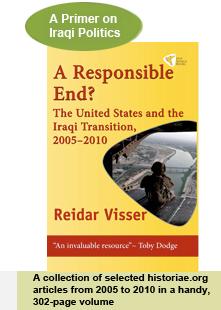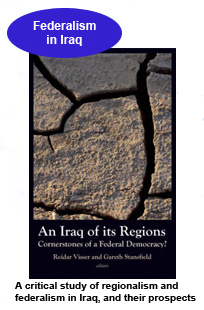



| Main | |
| Documents & images | |
| Links | |
| Contact | |
 | |
| amazon.com |

|
|
|
amazon.com
amazon.co.uk |
|

|
|
|
amazon.com
amazon.co.uk |
|
The Iraq Study Group: Regionalisation Not Balkanisation
By Reidar Visser (http://historiae.org)
6 December 2006
In a remarkable rejection of partitionist winds that have blown through America over the past year, the Iraq Study Group (ISG) in its report of 6 December 2006 recommended a final big push for the Iraqi national reconciliation process, with the collective effort of regional powers as a potential catalyst.
As far as state structure issues are concerned, partition (or any kind of unconstitutional federalisation, whether “from above” by Iraqi elite politicians or on the basis of foreign advice) was apparently never taken seriously by the ISG. Already prior to the release of the report, a few members of the ISG working groups had complained to the press that they had felt marginalised during the process and that their proposals never truly came on the agenda. The report itself rather brusquely dismisses the prospect of “devolution to three regions” (p. 43), citing arguments that for once are almost identical to those of the Bush administration: practical infeasibility and the dangers of greater regional chaos. Elsewhere, the report mostly shuns the federalisation question, with the implicit message that the ISG envisages this process to stay on track according to the constitution: outside Kurdistan, federal decentralisation is optional not mandatory, and if it is to be done, it will start by initiatives “from below” in the Iraqi governorates, not by Baghdad politicians or by outsiders with “plans” for Iraq.
Instead, the report advocates a serious attempt to get the national reconciliation process back on track, especially as regards re-inclusion of the Sunnis. To facilitate this, it proposes new initiatives at several levels. Perhaps most significantly, there are proposals to work for greater regional momentum that could be conducive to a more peaceful Iraq. The ISG advocates the creation of an “international support group” for Iraq that would include neighbouring states, which in a collective forum might be able to transcend some of their narrow interests linked to their particular protégées inside Iraq. Importantly, active steps to progress in the wider Arab–Israeli conflict and the Palestine issue are recognised as a central pillar for improving the regional atmosphere.
The ISG also suggests that the Iraqi government itself is not doing enough to drive the national reconciliation effort forward. It focuses on the need for rapprochement with the marginalised Sunnis, and introduces several new ideas about how to achieve that. These include a suggestion for United Nations support in the constitutional revision process, a rather outspoken criticism of the current Iraqi constitution’s allotment of undiscovered “future” oil fields to the regions instead of to the central government (apparently the criticism is also directed against regional control of the oil sector as such), international arbitration over Kirkuk, and a delay of the Kirkuk referendum (pp. 65–66.) There is also a more general “talk-to-everyone-but-al-Qaida” attitude throughout the report.
Many of these proposals are quite radical in that they explicitly challenge the current version of the Iraqi constitution. But at the same time they also serve as alternatives that could receive consideration in the constitutional review process. Some of these suggestions have earlier been floated in international NGOs and by figures working in the United Nations system. It is likely that the driving forces behind the 2005 constitution (chiefly the two big Kurdish parties and the Supreme Council for the Islamic Revolution in Iraq, SCIRI) will feel threatened by some of the recommendations in the report. On the other hand, these suggestions should appeal to a large silent majority of Iraqi nationalists of both Shiite and Sunni backgrounds, as well as to regional powers worried about Iraqi decentralisation spinning out of control.
In the current situation, regionalisation and multilateralism generally come across as good ideas, although the United States should not underestimate the desire of regional powers to keep them engaged, mired down in Iraq. The proposed overtures to regional powers in turn reflect a failure of United States policy in the Middle East in two areas. Firstly, inside Iraq, it relates to a communications problem. The ISG report explicitly acknowledges this (p. 14), asserting that the United States is “unable” to talk to the most important Shiite figure (the Grand Ayatollah Ali al-Sistani), and “does not talk” to another important political leader, Muqtada al-Sadr. This has led to sole reliance on the Shiite party that best understands how to deal with Washington – SCIRI – which happens to be the party with the most long-standing and systematic ties to Iran, and which is also the author of the Shiite federalism proposal that most infuriates the Sunnis. But SCIRI account only for some 23% of the deputies within the big pro-Shiite United Iraqi Alliance (UIA), and their elevation to a pre-eminent contact point reflects a failure on the part of Washington to engage other partners among the Shiites. This has created some remarkable contradictions in US policy. There was something distinctly Trojan about the way in which pro-Iranian SCIRI leader Abd al-Aziz al-Hakim was invited to Washington for high-level talks only days after a leaked memo by Secretary of Defence Donald Rumsfeld had advocated a robust strengthening of US forces along the border with Iran to physically protect Iraq against Iranian influences.
The second issue that has precipitated a turn to regional powers relates to overall US policy in the region. Importantly, the ISG recognises the inter-relationships between Iraq and broader regional issues. Until there is a minimum of consistency in the US approach to democracy and human rights issues across different countries in the Middle East, it will remain unable to conduct an ideological foreign policy and will rely on compromises with regional states. This also affects the situation in Iraq, where many parties are reluctant to talk to the United States precisely because they are unconvinced about Washington’s overall vision for the region. Until the US becomes more energetic in solving the Arab–Israeli conflict – chiefly by speeding up the process towards an independent Palestinian state within borders approximating the pre-1967 situation and with an honourable settlement for the 1948 refugees – this problem of scarcity of local pro-democracy partners will remain.
This document may be freely reproduced as long as http://historiae.org is credited as the source.
